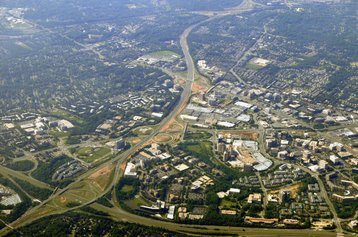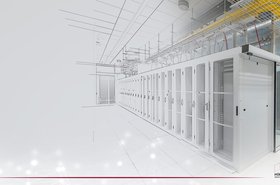Several Virginia politicians have proposed new bills to potentially put new restrictions on data center developments in the Commonwealth.
As reported by the Prince William Times and Virginia Mercury, a number of Republican and Democrat House Delegates and Senators have proposed new data center bills this month as the new political session for the year begins.
The bills vary but include new requirements for qualifying for tax exemptions, along with siting and noise restrictions, and energy use monitoring requirements.
Democrat Danica A. Roem, representing Virginia’s 30th district covering part of Prince William County including Manassas, has proposed five separate bills impacting data centers:
SB 284 Siting of data centers; impacts on resources and historically significant sites would require that data center land use applications can only be approved in areas where the data center will have a ‘minimal impact’ on historic, agricultural, and cultural resources, and not be within one mile of a national park, state park, or other historically significant site.
SB 285 Siting of data centers; site assessment would require a locality to disclose data center water and power usage at full build-out and perform a site assessment to examine the effect of the data center on water usage, the regional electric grid, and carbon emissions as well as any impacts on agricultural, historic, and cultural resources within the locality.
SB 286 Electric utilities; underground transmission lines would designate any construction of any underground electrical lines along a highway right-of-way within a half mile of a National Battlefield Park and within one mile of a state forest for data centers is in the public interest. This would likely ensure more transmission lines – often controversial with residents – are built underground.
SB 288 Data centers; noise abatement would require data center land use applications to be approved only in accordance with noise abatement requirements. Developers would have to incorporate sound mitigation methods and maintain a public website announcing times when backup generators will be in operation.
SB 289 Stormwater management regulations; enterprise data center operations directs the State Water Control Board to adopt regulations compelling stormwater management techniques for enterprise data centers located within one mile of any land owned or operated as a unit of the National Park Service or designated as a Virginia State Park or state forest.
Delegate Roem is largely against data center development in Prince William outside of set industrial parks and has previously said: “Data centers & their supporting infrastructure don’t belong in western PW outside Innovation Park, let alone by Manassas National Battlefield Park. I unequivocally oppose them and will legislate accordingly in ‘23.”
Roem last year introduced two bills – VA HB1986 and VA HB 1974 – set to increase building requirements of data centers near the state’s National Battlefield Parks. Neither were voted through.
Joshua E Thomas, a Democrat representing Virginia’s District 21 covering parts of Prince William County including Gainesville and Bull Run, has proposed three bills:
HB 337 Siting of data centers; impacts on resources and historically significant sites would, like Roem’s SB 284 bill, only allow data use applications to be approved in areas where the data center would have a ‘minimal impact’ on historic, agricultural, and cultural resources, and not be within one-half mile of a national park, state park, or other historically significant site.
HB 338 Siting of data centers; locality to perform site assessment before approval would – and again similar to Roem’s SB 285 – require localities to perform a site assessment to examine the effect of the data center on water usage and carbon emissions as well as any impacts on agricultural resources within the locality before granting any site approvals.
HB 340 Electric utilities; underground transmission lines would – similar to Roem’s SB 286 – designate underground lines for data centers as in the public interest.
Democrat Delegate Kannan Srinivasan, representing Virginia's House District 26 covering parts of Loudoun County including Brambleton, proposed HB 910 Department of Energy; data center energy usage.
The bill would require data centers in the Commonwealth to make a quarterly energy source report to the Department of Energy's Division of Renewable Energy and Energy Efficiency identifying the amount of energy consumed by the data center in the previous quarter, identified by source. The data would be published and available online. The bill also directs the Secretary of Commerce and Trade to convene a work group to estimate the future energy demands of the data center industry in the Commonwealth.
Republican Delegate Ian T. Lovejoy, representing Virginia’s House District 22 covering parts of Prince William County including Bristow, has proposed HB 1010 Siting of data centers; parks, schools, and residential areas.
This bill would only allow data center land use applications approved in areas that are one-quarter mile or more from federal, state, or local parks, schools, and property zoned or used for residential use.
Earlier this month, Democrat Delegate Rip Sullivan of Fairfax County proposed a bill to amend the state’s existing tax rules to require data center operators to meet certain energy efficiency standards in order to be eligible for the sales and use tax exemption for data center purchases.
Democrat Senator Suhas Subramanyam, representing Virginia District 32 covering Loudoun County’s Ashburn and Sterling, has proposed SB 192 Sales and use tax exemption: data centers. In very similar language to Delegate Sullivan’s bill, it would require data center operators to meet certain energy efficiency standards in order to be eligible for the sales and use tax exemption for data center purchases.
Subramanyam has also proposed SB 191 Electric utilities; data center demand, allocation of costs among customer classes. The bill would direct the State Corporation Commission to ensure that any proposal from a utility to meet the demand associated with data centers considers generation, transmission, and distribution system costs to meet such demand at the “lowest aggregate reasonable cost.”
The bill also directs the Commission to initiate a study to determine if data centers are receiving unreasonable subsidies from other customers and amend these costs if so.







